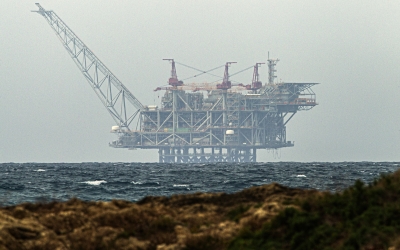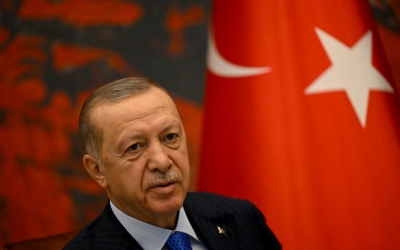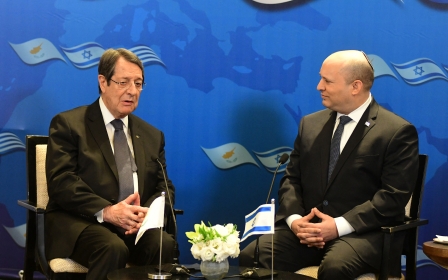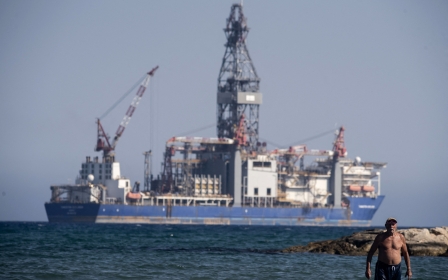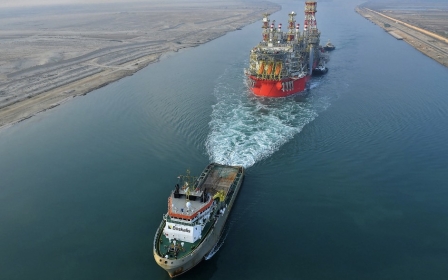Israel-Lebanon maritime talks ripple across eastern Mediterranean
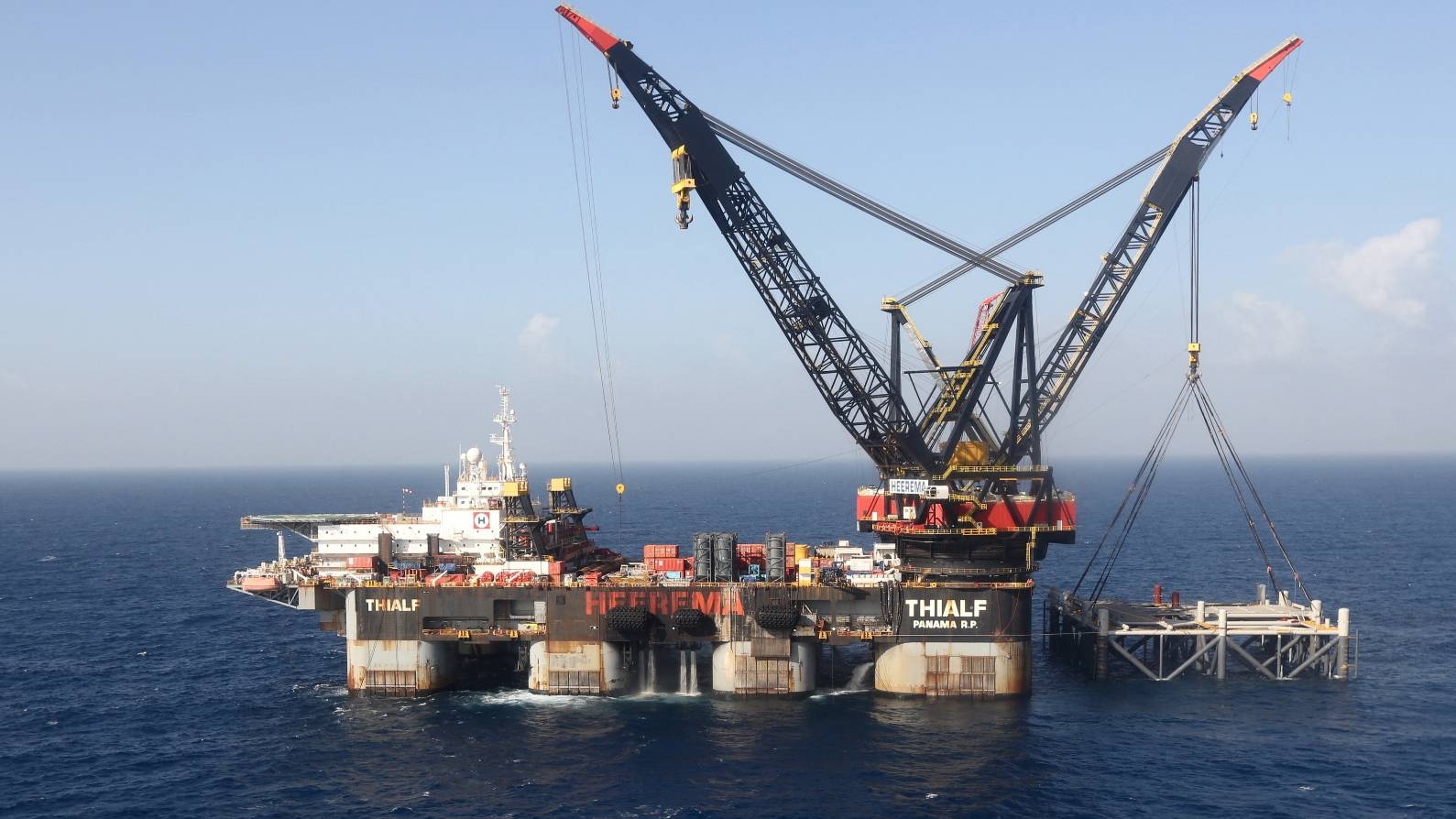
Maritime talks between Israel and Lebanon are being closely watched across the eastern Mediterranean in the hope that an agreement will boost interest in the region as it tries to position itself as an energy hub and alternative supplier to Russian gas.
For years, countries looking to tap resources below the Mediterranean have floated plans for a web of pipelines and cables that could connect them to markets in Europe. Their efforts have, however, been frustrated by geopolitical tensions and concerns over the economic viability of the projects.
Rivals Greece and Turkey are locked in a dispute over seabed territories believed to contain lucrative gas deposits, though neither has been able to move the process beyond infancy.
'An agreement between Beirut and Jerusalem would be a major boost for the eastern Mediterranean's role as an energy provider to Europe'
- Diplomatic source
Meanwhile, the divided island of Cyprus has made three major gas discoveries but has yet to begin drilling as the internationally recognised Greek Cypriot government in the south and Turkish-controlled northern Cyprus bicker over how to divide the resources.
While the Israel-Lebanon talks are not directly related to these tensions, diplomats and energy officials say a deal between the two countries, which are still technically in a state of war, would be a positive step for the region.
"An agreement between Beirut and Jerusalem would be a major boost for the eastern Mediterranean's role as an energy provider to Europe," a senior diplomat with knowledge of the talks told Middle East Eye.
Another diplomat following the talks told MEE: "Given the nature of energy projects - be it hydrocarbon extraction platforms, electrical connections, laying cables and pipelines - big capital is required and enormous risk is assumed. Delimitation provides much-needed legal certainty and security."
'Only the US'
The stakes are high. Israel says it will begin piping gas from Karish, one of the fields under dispute with Lebanon, by 1 October.
Lebanon's Iran-backed Hezbollah has threatened military action if Israel starts production before a maritime deal is reached. Last week, Hezbollah chief Hassan Nasrallah warned that "our missiles are locked on Karish".
Indirect talks brokered by the US are taking place on the sidelines of the UN General Assembly this week, with signs that a deal may be close.
Speaking at a press conference in New York on Wednesday, Israeli Prime Minister Yair Lapid expressed "cautious optimism" about the talks, while his Lebanese counterpart, Najib Mikati, said: "We are hopeful that we are in the final steps."
Current and former diplomats in the region told MEE that one positive from the negotiations has been greater US engagement in the eastern Mediterranean at a time when the Biden administration's focus has been on the war in Ukraine and great-power rivalry with China.
'Israel and Lebanon are "doing the bazaar". They departed from positions strictly on the UN Convention on the Law of the Sea and are trading based on how to mutually benefit from the resources'
- Laury Haytayan, Natural Resources Governance Institute, Beirut
"If a deal is reached, the US is the only country that could have delivered it," Eran Lerman, former deputy director for foreign policy and international affairs at Israel's National Security Council and vice-president of the Jerusalem Institute for Strategy and Security, told MEE.
"An agreement would reaffirm the US's diplomatic role in the region at a time when the Russians are facing challenges in Ukraine, casting doubt about the assumptions that have drawn people to Moscow in the region," Lerman said.
Diplomats say one example of greater engagement has been US and French lobbying efforts aimed at keeping France-based TotalEnergies involved in the region. In September, Lebanese President Michel Aoun even singled out the energy giant, saying it could help solve his country's dispute with Israel.
"When you see a big energy company like Total in the region, it helps ease concerns for other investors. It is a vote of confidence from the energy industry," a diplomat following the talks told MEE. "The eastern Mediterranean needs private investment."
Those efforts have been welcomed by states in the region as they look to develop eastern Mediterranean energy.
Spillover
In recent years, Greece, Cyprus and Israel have forged closer ties in hopes they can jointly monetise gas deposits, while also countering the muscular Turkish foreign policy of President Recep Tayyip Erdogan.
Their plans to construct a 1,900km pipeline from Israel to Europe suffered a blow earlier this year when the US pulled its support for the project, citing economic and environmental concerns.
Yet, they are moving ahead with a plan to lay an underwater cable linking their energy grids. In January, the EU approved 657m euros ($636m) for the EuroAsia inter-connector.
Greece is also expanding its gas terminals in the hope that it can receive LNG from Israel and Egypt following an memorandum of understanding signed by the two countries earlier this year to boost gas exports to Europe.
'Cooperation between Greece and Cyprus with gas exporters like Israel and Egypt is only set to increase in the future'
- Antonia Dimou, Institute for Security and Defence Analysis
"While gas from the eastern Mediterranean cannot make up for all of the shortfalls of Russian supplies, the war in Ukraine has made the region key to Europe's energy security," Antonia Dimou, head of the Middle East programme at the Athens-based Institute for Security and Defence Analysis, told MEE.
"Cooperation between Greece and Cyprus with gas exporters like Israel and Egypt is only set to increase in the future," she said.
While Egypt's economy is facing headwinds from the war, its gas sector is booming. Export revenue from liquefied natural gas (LNG) rose 98 percent in the first four months of this year, and LNG shipments to Europe more than doubled. Israeli gas production is up 22 percent, with a 50 percent rise in royalties from sales.
If a deal with Lebanon is reached, Israel is likely to see the most direct impact, as it already has the infrastructure in place to start piping gas. For Lebanon, the maritime agreement would be just a first step.
Lebanon launched a licensing round for exploration in 2013, but political gridlock, corruption and infighting dragged the process out for five years. The government extended new bidding in June up until the end of this year after limited industry interest.
More immediately, Beirut hopes that getting a deal over the finish line with Israel will help them import gas from Egypt via Jordan and Syria. Lebanon is in a deepening financial crisis and suffers from daily blackouts.
The proposal to ship gas from Egypt via the Arab Gas Pipeline was introduced by the US last year as a way to check Hezbollah's grip on the impoverished state's energy sector. However, Cairo is seeking assurances in Washington that it won't be punished under Caesar sanctions for sending gas through Syria.
"The US sees slow-rolling a waiver on Caeser sanctions as a source of leverage to keep Lebanon negotiating," a source briefed on the matter told MEE.
Prospects for the plan remain uncertain. In Congress there is bipartisan opposition to what many lawmakers view as a step towards normalisation with the government of Syrian President Bashar al-Assad. World Bank funding is also contingent on Lebanon's squabbling politicians reforming the energy sector.
Further afield, diplomats say one positive effect of a Lebanon-Israel deal could be in Cyprus, where it would serve as an impetus for Beirut and Nicosia to finalise demarcating their maritime border. Israel and Cyprus are also looking to find a compromise on how to develop a gas field straddling both their maritime zones.
The talks come as energy giants Eni and Total are looking to extract gas in Cypriot waters following a major discovery this summer. Exxon and Qatar Petroleum are also drilling in the area.
But longtime eastern Mediterranean observer Oded Eran, a senior research fellow at the Institute for National Security Studies and a former Israeli ambassador to Jordan and the EU, cautioned against looking for too many spillover effects from the maritime talks.
"Nothing will depend on the Lebanese-Israeli negotiations. The need for Mediterranean gas has increased because of the war in Ukraine and reactions from Europe. That remains a constant," he told MEE.
'Doing the Bazaar'
Another constant in the region is simmering tensions between Turkey, Greece and Cyprus. Ankara has sent drill ships into waters disputed with Athens and Nicosia and has warned its neighbours about cutting energy deals it says would deprive it of its rightful claim to regional gas deposits. Efforts at mediation have failed.
"Greece and Cyprus are following the negotiations with Lebanon as a positive development," Constantinos Filis, executive director at the Institute of International Relations at Athens Panteion University, told MEE. "But it seems the disputes with Ankara are being left to solve last."
Turkey welcomed the US decision to pull its support for the EastMed pipeline. It has floated its own proposal to pipe Israeli gas through its mainland as a cheaper alternative.
That idea has gained some traction as ties between Turkey and Israel thaw. On Tuesday, Erdogan met with Israeli Prime Minister Yair Lapid for the first face-to-face talks between the countries' leaders since 2008.
Laury Haytayan, MENA director of the Natural Resources Governance Institute in Beirut, says that a successful resolution of talks between Israel and Lebanon may offer a future template for negotiations between Greece and Turkey after years of failed mediation.
"If Greece or Turkey were to actually find commercially viable gas in their disputed zone, we have to see it not as an escalation but as an opportunity because of what is happening between Israel and Lebanon," she said.
"Israel and Lebanon are 'doing the bazaar'. They departed from positions strictly on the UN Convention on the Law of the Sea and are trading based on how to mutually benefit from the resources. If the talks are a success, it might open the eyes to others about being more creative in maritime talks."
Middle East Eye propose une couverture et une analyse indépendantes et incomparables du Moyen-Orient, de l’Afrique du Nord et d’autres régions du monde. Pour en savoir plus sur la reprise de ce contenu et les frais qui s’appliquent, veuillez remplir ce formulaire [en anglais]. Pour en savoir plus sur MEE, cliquez ici [en anglais].


